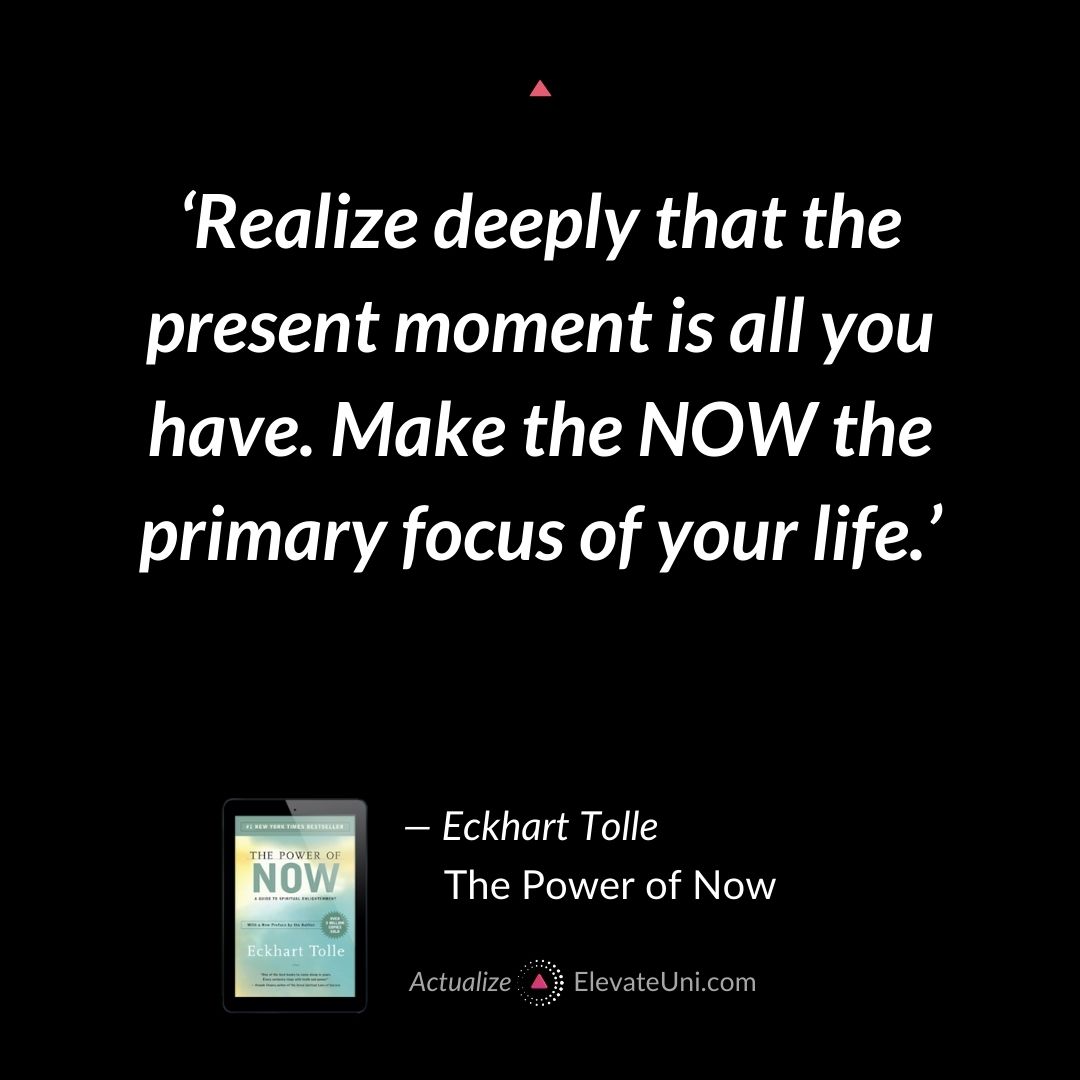Realize deeply that the present moment is all you have. Make the NOW the primary focus of your life.
What's the meaning of this quote?
Quote Meaning: The present moment is all we truly have, and it's essential to make it the primary focus of our lives. Dwelling in the past or constantly striving for the future can distract us from the richness of the present moment. By being fully present, we can fully engage in our experiences, make meaningful connections, and savor the beauty of life. It's a reminder to cultivate mindfulness, embrace the present moment, and make the most of it in our journey of personal growth.
Who said the quote?
The quote “Realize deeply that the present moment is all you have. Make the NOW the primary focus of your life.” was said in the book The Power of Now (Summary / Quotes) by Eckhart Tolle. Eckhart Tolle: German-born spiritual teacher and author of "The Power of Now" and "A New Earth."
How can the quote be applied in a real-life scenario?
This quote emphasizes the importance of mindfulness and living in the present moment. It encourages individuals to fully engage with their current experiences and not be overly preoccupied with the past or future. Here's how it can be applied in various real-life scenarios:
Stress Reduction: In today's fast-paced world, stress and anxiety often result from worries about the future or regrets about the past. This quote encourages people to focus on the present, which can reduce stress and promote mental well-being. Techniques such as mindfulness meditation help individuals achieve this state of presence.
Personal Relationships: Healthy relationships thrive when individuals are fully present with their loved ones. Being attentive and engaged in the moment fosters deeper connections and meaningful interactions. This applies to romantic relationships, friendships, and family dynamics.
Work Productivity: At the workplace, distractions and multitasking can hinder productivity and job satisfaction. Embracing the present moment and giving full attention to tasks can lead to better concentration, creativity, and overall job performance.
Health and Wellness: Making healthy lifestyle choices often requires being in the present moment. Mindful eating, for instance, involves savoring each bite and paying attention to hunger and fullness cues. Similarly, regular exercise is more effective when individuals are fully engaged in their workouts.
Creativity and Innovation: Creative endeavors benefit from a focused, present mindset. Artists, writers, and innovators often find inspiration and breakthroughs when fully immersed in their creative process. This quote encourages them to embrace the now to enhance their creativity.
Mental Health: People dealing with mental health challenges, such as depression or anxiety, can benefit from mindfulness practices that help them stay grounded in the present. By letting go of ruminative thoughts about the past or worries about the future, individuals can find relief from emotional distress.
Environmental Awareness: Environmentalists and conservationists advocate for mindful consumption and sustainable practices. This quote aligns with the idea of being present in our choices, considering the impact on the environment, and making responsible decisions.
In essence, this quote promotes the idea of living mindfully and embracing the richness of the present moment. It reminds us that our lives are primarily experienced in the now and encourages us to savor, appreciate, and engage fully with our current experiences, ultimately leading to a more fulfilling and balanced life.
Is there a historical example that illustrates the message of the quote?
Historical Example: The Life and Teachings of Zen Master Thich Nhat Hanh - This quote emphasizes the importance of mindfulness and living in the present moment, and it finds a profound illustration in the life and teachings of Zen Master Thich Nhat Hanh, a renowned Vietnamese Buddhist monk and peace activist.
Thich Nhat Hanh, born in 1926, has dedicated his life to promoting mindfulness, compassion, and peace. He is known for his simple yet powerful teachings that encourage individuals to be fully present in every moment of their lives.
During the Vietnam War, Thich Nhat Hanh played a significant role in advocating for peace and reconciliation. He traveled around the world, meeting with world leaders and speaking out against violence and suffering. His commitment to peace was unwavering, even in the face of immense challenges and personal danger.
Thich Nhat Hanh's teachings on mindfulness emphasize the practice of being fully aware of the present moment, whether it's while eating, walking, or simply breathing. He encourages people to embrace each moment with mindfulness and compassion, recognizing that the past is gone and the future is uncertain.
One of his well-known practices is mindful breathing, which involves focusing on the breath to anchor oneself in the present. Thich Nhat Hanh's teachings remind us that by cultivating mindfulness, we can reduce stress, enhance our well-being, and foster greater understanding and compassion in our relationships with others.
Throughout his life, Thich Nhat Hanh's actions and teachings have embodied the quote's message of making the present moment the primary focus of one's life. His dedication to mindfulness, peace, and compassion serves as an inspiring example of how living in the present moment can lead to a life of purpose, inner peace, and positive transformation, and how it can also contribute to the greater good of humanity.
Chief Editor
 Tal Gur is an author, founder, and impact-driven entrepreneur at heart. After trading his daily grind for a life of his own daring design, he spent a decade pursuing 100 major life goals around the globe. His journey and most recent book, The Art of Fully Living, has led him to found Elevate Society.
Tal Gur is an author, founder, and impact-driven entrepreneur at heart. After trading his daily grind for a life of his own daring design, he spent a decade pursuing 100 major life goals around the globe. His journey and most recent book, The Art of Fully Living, has led him to found Elevate Society.























